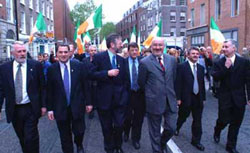 |
Irisch
Republikanische Solidarität
|
 |
UNCERTAINTY FOR OTRs
Republicans 'on the run' from potential conflict-related
prosecutions face an uncertain future following a sudden decision
of the British government to abandon new legislation intended to
regularise their status.
British Direct Ruler Peter Hain withdrew the Northern Ireland
(Offences) Bill from the London parliament on Wednesday.
The bill faced strong opposition from both unionists and
nationalists.
Unionists attacked what they described as an amnesty for
'terrorists', while nationalists reacted angrily when it was
revealed the legislation would block the future prosecution of
British Crown force members involved in the murder of Catholics.
The British government and Sinn Fein have spent the last 48 hours
attacking each other following the dramatic collapse of the
legislative proposals.
Sinn Fein, which had sought such a bill in negotiations,
initially supported the proposals, but withdrew that support amid
a growing nationalist backlash over the inclusion of Crown force
members.
"How on earth they thought security forces could be excluded, I
don't know," moaned British Direct Ruler Peter Hain on Wednesday,
as he pulled the proposals.
No alternative is planned and it appears the British government
intend to put the issue off until the conclusion of the next
round of peace talks.
Up to 150 people will remain exiled after the plan to allow
their return was scrapped.
They would have had their cases heard by a special tribunal and, if
found guilty, would have been freed on licence without having to
go to jail.
Sinn Fein accused Mr Hain and his government of deceptively
trying to use the legislation to hide the truth about British
collusion in murder and other crimes.
"Any objective examination of the British government's approach
to date on this question will show its overriding concern has
consistently been to hide the truth about its own role in the
conflict," said party spokesman Philip McGuigan.
Victims groups welcomed the scrapping of the legislation.
Mark Thompson of Relatives for Justice said now was the time for
the British government to deal properly with a truth recovery
process.
"We would say now is the optimum moment for the British
government to engage in a genuine truth recovery process which
adheres to international principles of truth recovery, ie, that
it is independent and international and that it deals with a
collective past," he said.
"The legislation should never have been introduced in the first
place. It was wrongly called on-the-run legislation because the
primary beneficiaries would have been the British government,
which could have used public immunity to cover up what it has
been up to."
The Pat Finucane Centre, which has been campaigning for an
independent international inquiry into the murder of the Belfast
solicitor and allegations of security force collusion in the
killing, welcomed the announcement.
It said the legislation had been "fundamentally flawed".
"We welcome the fact that this legislation has been withdrawn and
call on the British government to engage in a genuine
consultation on the way forward, bearing in mind international
standards for truth recovery," it said.
Robert McClenaghan of republican group An Fhirinne described
yesterday's decision as "excellent news".
"The British government was trying to be very deceitful and was
using a piece of legislation for dealing with on-the-runs as a
way of getting Crown forces, who have been engaged over 30 years
in mass murder, off the hook," he said.
Currently, any IRA Volunteer prosecuted and jailed in connection
with charges arising from the conflict before 1998 is entitled to
be released under licence.
However, one Donegal-based councillor has said he should not have
to wait months for new laws to allow him back to the Six
Counties.
PSNI still want to question Gerry McMonagle in relation to an IRA
attack in 1982, despite having already been cleared by a
magistrate.
Mr McMonagle said the issue "has to be resolved with the people
who it affects the most".
"These are the people who have since 1970 until the present day
to leave their homes through one reason and another, and one
injustice and another," he said.
"The way to get it resolved is to ensure the British forces
aren't included in the legislation and to get it back in
Parliament as soon as possible."
DUBLIN CRITICISED
Meanwhile, Sinn Fein has criticised the Dublin government for
putting on hold its plans to give an amnesty for a small number
of republicans.
Around six IRA members wanted south of the border had hoped to be
able to return home. However, the plan has been suspended by
Dublin's Foreign Minister, Dermot Ahern.
Sinn Fein's Gerry Kelly, who was himself on the run in the 1980s,
said Dublin had no requirement to follow the example set by
London.
"The fact was that in the south there is a much smaller number
that would be involved," he said.
"But it was still an anomaly which came from the Good Friday
Agreement and could have been sorted out."
"The fact that the British have acted in bad faith should be no
reason for the Irish government to join them in terms of them
refusing to go ahead with this process."
Letzte Änderung:
27-Jan-06